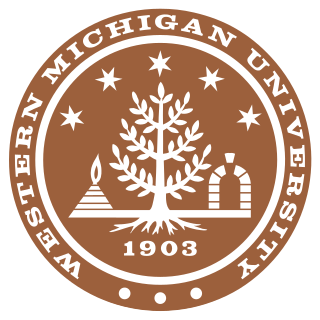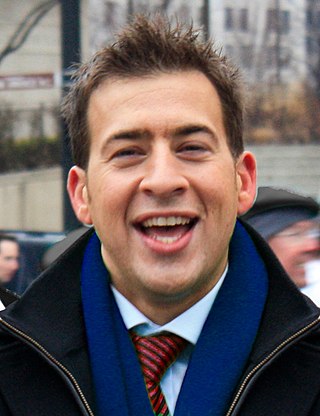Related Research Articles

Western Michigan University is a public research university in Kalamazoo, Michigan, United States. It was initially established as Western State Normal School in 1903 by Governor Aaron T. Bliss for the training of teachers. It was renamed Western Michigan University in 1957.

Michigan State University is a public land-grant research university in East Lansing, Michigan. It was founded in 1855 as the Agricultural College of the State of Michigan, the first of its kind in the United States. After the introduction of the Morrill Act in 1862, the state designated the college a land-grant institution in 1863, making it the first of the land-grant colleges in the United States. The college became coeducational in 1870. In 1955, the state officially made the college a university, and the current name was adopted in 1964. Today, Michigan State has rapidly expanded its footprint across the state of Michigan with facilities all across the state and one of the largest collegiate alumni networks with 634,000 members.
A 529 plan, also called a Qualified Tuition Program, is a tax-advantaged investment vehicle in the United States designed to encourage saving for the future higher education expenses of a designated beneficiary. In 2017, K–12 public, private, and religious school tuition were included as qualified expenses for 529 plans along with post-secondary education costs after passage of the Tax Cuts and Jobs Act.
A registered education savings plan (RESP) in Canada is an investment vehicle available to caregivers to save for their children's post-secondary education. The principal advantages of RESPs are the access they provide to the Canada Education Savings Grant (CESG) and as a method of generating tax-deferred income.
Matching funds are funds that are set to be paid in proportion to funds available from other sources. Matching fund payments usually arise in situations of charity or public good. The terms cost sharing, in-kind, and matching can be used interchangeably but refer to different types of donations.

Alexander Giannoulias is an American financier and politician who is the Secretary of State of Illinois. He previously served as the 72nd Illinois Treasurer from 2007 to 2011.
The Balanced Budget Act of 1997 was an omnibus legislative package enacted by the United States Congress, using the budget reconciliation process, and designed to balance the federal budget by 2002. This act was enacted during Bill Clinton's second term as president.

Dereck Eugene Davis is an American politician serving as the Treasurer of Maryland since 2021. He is a former member of the Maryland House of Delegates from the 25th district.
The Canada Education Savings Grant (CESG) is part of a Government of Canada program, administered through Employment and Social Development Canada, to assist with savings for Canadian children's higher education. Under the CESG program, the government will contribute an amount to a Registered Education Savings Plan (RESP) according to a formula which is dependent on the amount contributed and the income level of the family making the contributions. As of 1 July 2005, the CESG is legislated by the Canada Education Savings Act.

A target date fund (TDF), also known as a lifecycle fund, dynamic-risk fund, or age-based fund, is a collective investment scheme, often a mutual fund or a collective trust fund, designed to provide a simple investment solution through a portfolio whose asset allocation mix becomes more conservative as the target date approaches.
The Guaranteed Education Tuition Program, or GET Program, is one of two 529 college savings plans administered by Washington College Savings Plans (WA529). WA529 is part of Washington Student Achievement Council, an agency of the U.S. state of Washington for residents of the state. GET is a 529 prepaid tuition savings plan, while Washington's other plan, DreamAhead, is a 529 college investment plan. As with any 529 plan, account owners invest in the program on behalf of a beneficiary – typically the owner's child or grandchild – in order to prepay for expenses associated with the beneficiary attending a higher education institution.
Maryland 529 — formerly College Savings Plans of Maryland — is an independent, non-profit State agency that provides flexible and affordable college and disabilities savings plans, in accordance with sections 529 and 529A of the Internal Revenue Code. The two college savings plans are offered to help families save for future education expenses and reduce dependence on student loans later.
A registered disability savings plan is a Government of Canada program designed to enable individuals with disabilities, with assistance from family and friends to save for their future financial security. The Government of Canada assists people to save with the Canada Disability Savings Program, consisting of the Canada Disability Savings Grant and Canada Disability Savings Bond. The Canada Disability Savings Grant matches personal contributions. The Canada Disability Savings Bond provides funding to RDSPs of people with low and moderate incomes.
Virginia529 or Virginia529 College Savings Plan is the independent state agency responsible for Section 529 qualified tuition programs offered by the Commonwealth of Virginia. Since 2018, Morningstar has named Virginia's Invest529 plan among the top 529 college savings plans in its annual analysis. According to U.S. News & World Report, Virginia's 529 offers a "whopping" 27 funds and six multi-fund options in its static track. Further, US News reports that "Morningstar applauds the plan’s low costs, relative to other advisor-sold programs."
Children's Savings Accounts (CSAs) are a type of savings accounts in the United States, usually specifically designed for higher education savings. They are often available through state or local government programs or nonprofit organizations, in partnership with banks and credit unions. CSAs can be based in state-sponsored 529 plans or other investment products such as Coverdell Education Savings Account, and usually allow deposits from children, parents, and relatives as well as third parties such as school districts and scholarship programs. Many CSAs begin with an initial deposit from government or a nonprofit in the name of the child and subsequent family contributions are often encouraged by matching funds. CSAs often incorporate incentives to encourage saving by disadvantaged youth and families. Withdrawals from CSAs are generally limited to higher education expenses, after the child turns 18. Following college graduation, unspent funds can often be used for other asset purchases or for retirement savings. CSA programs can also include financial education to teach children and families about financial institutions' products, smart consuming and saving practices, and strategies for long-term investing.

Wealthfront Inc. is an automated investment service firm based in Palo Alto, California, founded by Andy Rachleff and Dan Carroll in 2008. As of 2022, Wealthfront had $27 billion AUM across 470,000 accounts.
Ascensus, LLC. is an American financial services company. It offers savings plans of various kinds. It was founded in 1980; the head office is in Dresher, Pennsylvania.
An ABLE account, also known as a 529 ABLE or 529A account, is a state-run savings program for eligible people with disabilities in the United States. Rules governing ABLE accounts are codified in Internal Revenue Code section 529A, which was enacted by the Achieving a Better Life Experience (ABLE) Act in 2014. With limitations, funds in an ABLE account are exempt from the Supplemental Security Income (SSI) and Medicaid asset limit, and earnings are exempt from federal income tax.

The Setting Every Community Up for Retirement Enhancement (SECURE) Act of 2019, Pub. L.Tooltip Public Law 116–94 (text)(PDF), was signed into law by President Donald Trump on December 20, 2019 as part of the Further Consolidated Appropriations Act, 2020.
DreamAhead College Investment Plan is a higher education savings program administered by the State of Washington. The plan was created in 2016 by the Washington State Legislature, and statutorily known as the Washington College Savings Plan, and opened for nationwide participation in 2018. It is one of two 529 programs offered by the state, the other being the Guaranteed Education Tuition Program, which is a prepaid program. The programs are supported by Washington College Savings Plans, a division of Washington Student Achievement Council.
References
- ↑ October 28, Michael S. Fischer |; PM, 2020 at 02:47. "Best 529 College Savings Plans of 2020: Morningstar". ThinkAdvisor. Retrieved 2020-10-29.
- ↑ Hume, Madeline (October 27, 2020). "The Top 529 College Savings Plans of 2020". Morningstar.com. Retrieved 2020-10-29.